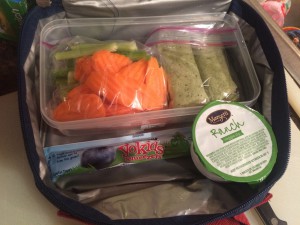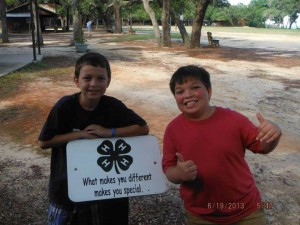by Melanie Taylor | Aug 29, 2015

Healthy School Lunch
Packing the kids’ lunches for school means you know which nutritious foods they are eating. Here are some budget-friendly, creative ideas to keep kids happy and healthy at lunchtime.
Make a “Smarter” Sandwich:
While some kids prefer the same thing every day, others may be okay with a slight switch to their sandwich.
- Use different breads like 100% whole wheat tortilla wraps (choose wraps low in saturated and made with no hydrogenated oils) or 100% whole wheat pita pockets.
- Besides lettuce, try shredded carrots or avocado slices with a turkey sandwich.
- Buy blocks of low fat, low-sodium cheeses. You save money when you slice it yourself. Or use a cookie cutter to cut into fun shapes.
- Instead of lunchmeat, try a leftover grilled chicken sandwich with lettuce and tomato.
Love Those Leftovers:
Try using the leftovers from the family dinner for the next day’s lunch. Invest in a thermos to keep foods hot or cold until lunchtime.
- Low-sodium tomato, vegetable or bean soups
- Chili made with lean or extra lean ground turkey
- Whole wheat spaghetti with low sodium tomato sauce
- Low-sodium baked beans, bean casserole or beans & rice
Let Them Dunk:
Sometimes it is okay to let your kids play with their food, especially when they are getting extra nutrition.
- Apple and pear slices to dip into low-fat plain yogurt mixed with peanut butter.
- Carrot, celery and sweet pepper strips to dip into hummus, fresh salsa or homemade bean dip.
- Whole grain crackers (choose crackers low in sodium and saturated fat and made without hydrogenated oils) to dunk into low-sodium vegetable or tomato soup.
- Unsalted sunflower seeds, crushed whole wheat cereal and sliced banana to mix into low fat vanilla yogurt (no added sugars) to eat with a spoon like a sundae.
Get Them Involved:
While letting kids in the kitchen might mean a bigger mess, if they help pack their own lunch, they are more likely to eat it! On nights you have a bit more time, like a Sunday night, have them choose which piece of fruit or what type of whole grain bread they want and let them assemble their lunch. Make this a weekly routine – it’s another great way to spend family time together.
For more heart healthy lunch tips visit: http://www.heart.org/HEARTORG/
by Monica Brinkley | May 13, 2015

With summer around the corner, it’s a great time to enroll your children in residential and/or day camps. For most communities there are a variety of camps offered. Camping experiences not only give children something to do, they are also great learning experiences.
Just as a garden or flowerbed requires critical elements like water, sunshine, space, and freedom from bugs to grow and to flourish, so do children. Similar to other living things, you need nourishing, supportive and protective environments where youth can grow to be healthy and contributing adults.
Each young person needs to:
Know they are cared about by others: Belonging
Feel and believe they are capable and successful: Mastery
Know they are able to influence people and events: Independence
Practice helping others: Generosity
Camps offer environments for growth, rich in the essential elements that support healthy development.
Very enthusiastic older youth and caring adults are the staff that lead the camps. Participating youth develop meaningful relationships with admired and trusted adults and older teens. New relationships begin as the campers share cabins and engage in camp activities. As a result of these experiences, the campers develop a sense of belonging as they realize that they are cared about by others.
During camp, youth develop many new skills. Camp teaches children to communicate, to work together as part of a team and to be a leader. Residential camps do this as the children learn to live in the same cabin and perform daily living chores. Leadership is developed by asking campers to fulfill responsibilities that may not be expected of them elsewhere. Additionally, sharing resources and attention helps foster teamwork and the desire to participate. Campers gain the sense of mastery as they become capable and successful at new skills.
There is a sense of adventure and challenge not usually found in daily home life. Most camps offer time for youth to test new ideas in a non-threatening environment. It pushes children out of their comfort zone and exposes them to new activities and experiences that they may not be familiar with. Many youth discover new hobbies or passions. By exploring various types of activities, children have a greater chance of finding something that they excel at or that makes them happy. Independence is gained as they are able to influence people and events.
Camp also provides many opportunities for youth to help fellow campers through daily chores of cleaning up cabins and dining hall, encouraging campers who may be homesick, cheering on their team, assisting camp staff, and so on. Our society needs for more people to gain the practice of helping others – that element of generosity.
Camp offers youth an opportunity to accept new responsibilities in leadership, conquer fears, practice new skills, and discover individual differences in an environment that reinforces the value of each person. These essential elements should be a focus of every camp. So as you seek camp opportunities for you children this summer, look for ones that feature these four essential elements. 4-H camping opportunities are available in every county in the state of Florida. Look them up and enroll your child today.

by Ricki McWilliams | Apr 14, 2015
 Spring has Sprung
Spring has Sprung
Still trying to get past those winter blues? Get outside, enjoy the Spring weather, and do something active! Regardless of age or fitness level it is important to incorporate physical activity into your daily routine.
Some people might say they cannot be active due to lack of time however, fitting in physical activity can be simple and easy. As little as 10 minutes of activity at a time can provide healthful benefits. Being physically active can limit conditions such as heart disease, type 2 diabetes, high blood pressure, high blood cholesterol, and risk of stroke (Physical Activity, 2015). There are many types of physical activity; aerobic, muscle strengthening, bone strengthening, and balance and stretching.
To make exercise easy, fun and beneficial just mix and match:
- take a 10 minute walk at lunch time
- walk the dog
- garden
- lift weights
- join an exercise group
- practice yoga
- jump rope
- swim
Make being active a family affair. Strengthen family bonds and improve quality of life through a variety of outdoor activities that provide exercise and entertainment. Outdoor family fun activities include but are not limited to: walking, hiking, swimming, running, bicycling, kayaking, canoeing, and tree climbing. The body is able to convert sunshine into vitamins and when physically active the body releases good endorphins improving mood/outlook. Good for the mind and body, outdoor activities can also increase awareness of the environment, as well as, be easy on the budget.
Click here for more tips on how to increase physical activity at home, work and play. Make being active a part of your daily routine.
Still feeling like there are barriers keeping you from being active? Read more here on overcoming common barriers to physical activity.
Resource:
Physical Activity. (2015). http://www.choosemyplate.gov/physical-activity/why.html
by Kristin Jackson | Mar 17, 2015

Bindaas Madhavi. (2011) Listen to Your Kids.
Most parents would not allow their child to play in the street or to touch a hot stove because parents understand that these actions have consequences and the consequences are serious. If you don’t talk with your child about money and allow them to observe you exhibiting positive financial behaviors, this can also have serious consequences. One indicator of an individual’s financial capabilities is their credit score. A poor credit score can impact an individual’s ability to get a job, secure housing, purchase reliable transportation and access other forms of credit.
According to FINRA Investor Education Foundation State Financial Education Mandates, three years after Georgia, Idaho and Texas implemented a financial education mandate, credit scores of participants improved. In 2014, Florida also voted to adopt financial education into its social studies standards for students in grades K-12 and financial education is now a graduation requirement. While incorporating financial education into schools is an important step, parents still play an important role in financial socialization (establishing what is normal in terms of financial behaviors). In fact, research shows that time preference patterns and delay of gratification patterns are set by age five or before a child reaches kindergarten. Time preference patterns and delay of gratification patterns are often exhibited by adults through savings and budgeting. In a recent study by Cho, Gutter, Kim and Mauldin, the researchers found the effects of financial socialization had significant effect on the financial behaviors of low- to moderate-income adults aged 24-66, indicating that the time preference patterns children develop in youth could last a lifetime.
UF/IFAS Extension Northwest District Family & Consumer Sciences (FCS) Agents know that, as parents, you want to protect your child or children from things that have negative consequences whether it be an inattentive driver, a hot stove, or a poor credit score. One of the things parents can do immediately, to impact what their child is learning about money and how their child is being financially socialized, is to talk with their child about money. Some ideas to get your family conversations about money started are to discuss:
– Wants versus needs
– The grocery budget
– Household expenses
– How your child can earn/save money
If you are still a little nervous about starting the conversation as a result of concerns about your own financial capabilities, contact your local UF/IFAS Extension Office and ask about our Master Money Mentor Program or upcoming financial classes. If you can’t wait for a class, check out these additional resources:
Talking to Children about Money: http://www.ag.ndsu.edu/pubs/yf/famsci/fs1441.pdf
Are Your Children in the Middle of your Conflict or Divorce? http://goo.gl/lpXwwc
9 Important Communication Skills for Every Relationship http://edis.ifas.ufl.edu/pdffiles/FY/FY127700.pdf
Remember a family conversation about money is one conversation that is too important to wait. Make a money date with your child or children today!
References:
Cho, Gutter, Kim and Mauldin. (2012). The Effect of Socialization and Information Source on Financial Management Behaviors among Low-and Moderate-Income Adults. Family & Consumer Science Research Journal. 40(4): 417-430
Council for Economic Education. (2015). Survey of the States. Retrieved 16 March 2015 from http://www.councilforeconed.org/news-information/survey-of-the-states/
National Financial Educators Council. (2013) Financial Education Impact. Retrieved 16 March 2015 from http://www.financialeducatorscouncil.org/financial-literacy-statistics/
by Shelley Swenson | Jan 30, 2015

“Oh where does all my money go?”
Do you need help managing your finances so that your family can realize more of their needs and wants? Family members of all ages must learn to communicate and understand what their financial situation is. Open discussions among family members often results in greater cooperation when deciding what the best things upon which to spend. Family members need to understand the difference between a need and a want. Then an open discussion can set priorities for the money available.
Your family may decide to reduce spending so that more needs and wants of each family member can be made. Here are a few suggestions:
- Categorize your expenses in two categories: wants and needs. Make everyone aware of the difference and how important it is to consider each purchase through this categorization. Needs include housing, basic utilities, childcare, etc. Wants could include going out to eat, high fashion, newest electronics, etc. Everyone has to understand that a want purchase can be spaced over time.
- Do not let your impulse determine purchases. Postpone unplanned purchases at least 24 hours so you can rethink your plan.
- Before purchasing an item, ask yourself, “Why?” Many people are now wearing a plastic bracelet that reads “Do I really need this?” It helps them make decisions based on wants and needs.
- Save on food by planning meals with abundant seasonal items and based on supermarket specials. Check the store ads and utilize coupons to buy what is on your list but don’t let the coupon result in your buying items you would not buy without a coupon. Make a list before going to the supermarket and then work your list.
- If you have debts, accelerate repayment. There is little reason to retain savings that earn 3% interest while you still owe installment debts and loans that carry true interest rates of 12%-22%. Yes, everyone needs an emergency fund but after it is secured, repay your loans.
Want additional suggestions on how to cut expenses and save money? Go to www.edis.ifas.ufl.edu and request the bulletin FCS7009.
by Dorothy C. Lee | Dec 9, 2014
 Christmas is a joyous season. It’s a time to remember friends and neighbors with small tokens of your love and appreciation.
Christmas is a joyous season. It’s a time to remember friends and neighbors with small tokens of your love and appreciation.
Every holiday season is magical, but it also can be a perplexing time. How do you choose gifts for your friends and loved ones that are unique and sure to be cherished?
Remember Christmas when you were young? How the simplest projects—stringing lights, hanging icicles, baking cookies, gathering pine cones, or making ornaments for the tree—filled the season with fun and excitement. Bring back that special magic with your own holiday projects. These holiday projects are gifts from the heart.
If you have spent many hours in past seasons trying to find the answer to the perplexing question of what to give, perhaps this year you can find the answer in your own kitchen. Flavorful gifts you can create in an evening or two at home might be just the solution. Most of us like to follow the pleasure of cooking with sharing the scrumptious results. So this holiday season, prepare some delicious food gifts for friends and relatives.
A jar of homemade jam or jelly conveys a welcome sign of friendship to neighbors or co-workers. Besides being fun to make and share, oven-baked goods, snacks, and other savory items are attractive and often cost less than those that are store-bought. This is a gift that comes from the heart without breaking the bank. For a holiday touch, add a pretty ribbon or a note from a square of wrapping paper.
Fresh from the oven, a batch of pumpkin muffins or a loaf of whole grain bread will send warm holiday greetings to friends. Decorated with raisins and nuts, gingerbread men will appeal to anyone who fancies the spicy flavors of cinnamon, ginger, and cloves. When invited to festive dinners, take along a basket filled with your own gift assortment of cookies packaged in inexpensive containers with recipes and a personalized message included. You will find these gifts easy to transport and the hostess is sure to appreciate the gesture.
Another gourmet goodies idea to consider is sharing a decorative jar or tin packed with flavorful popcorn or a nutritious trail mix. Top a decorative tray with herbed cheese rounds. Herbs offer a delicious alternative to salt. Herb seasoning mixes can be packaged in a decorative glass jar or bottle and tied with festive ribbon. Be sure to attach a label with instructions for serving and a recipe for making more.
When making these gourmet goodies, you might want to prepare an additional batch so you will have a last-minute gift on hand. The additional jar of jam or jelly can make a special gift for unexpected visitors. These gifts are seen as thoughtful and well-prepared when, in reality, they are a last-minute thought.
Start early and make lots of homemade goodies for the holidays. By planning your kitchen gifts early, you can shop for ingredients on sale, save decorative containers, and make food items in advance. So get a head start on holiday gifts from your kitchen. Happy Holidays!







